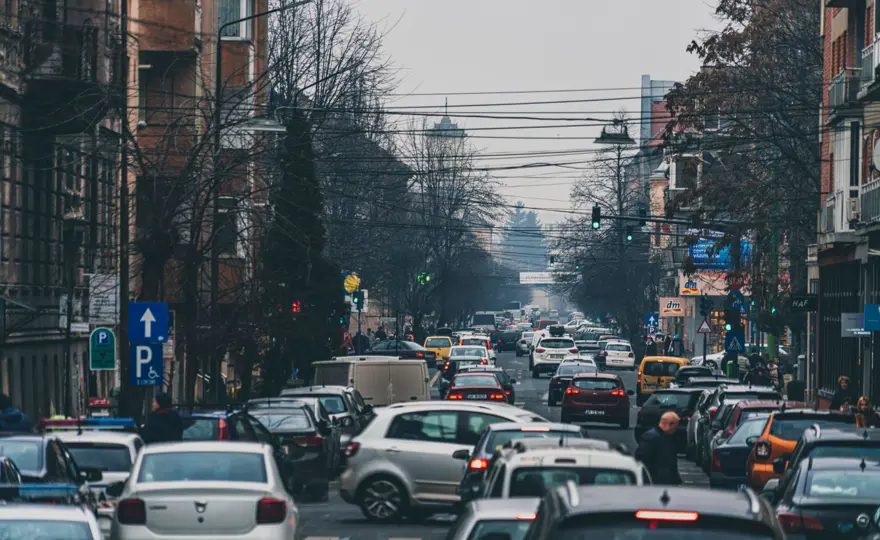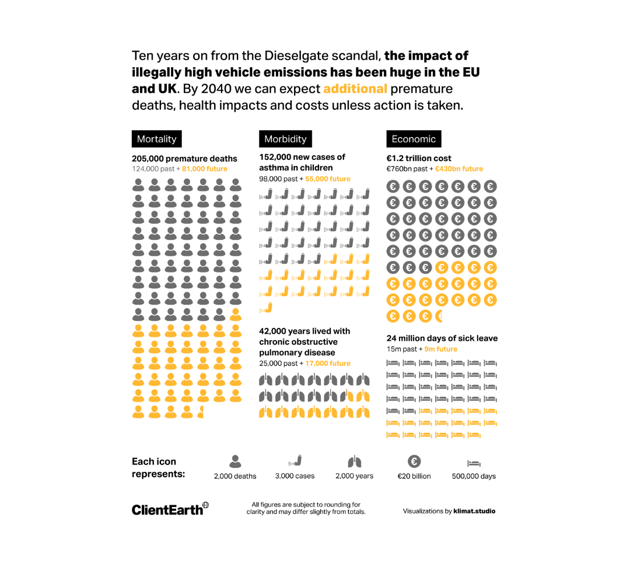ClientEarth Communications
28th May 2025


Ten years on from the original Dieselgate scandal, there are still millions of excessively polluting diesel vehicles on our roads. We and our NGO partners sent legal complaints to the UK and French governments in 2023 for failing to tackle the issue. They have now launched investigations but action is not happening fast enough and these cars are still polluting our roads and harming our health. A new report now exposes the staggering human and economic costs inflicted on the EU and UK, which will continue to mount unless action is taken. Governments need to hold these car companies to account once and for all to deliver the solutions needed to protect people’s health.
The Dieselgate scandal broke in 2015, revealing that millions of Volkswagen diesel vehicles were fitted with a specific form of ‘defeat device’.
Defeat devices affect the operation of an engine's emission control system – by switching it off or reducing its effectiveness when outside of testing conditions. This means that in the real world these vehicles can emit levels of pollution well over legal limits.
Since 2015, the top European court has issued rulings which make it clear that the use of defeat devices is only permitted under extremely narrow circumstances. While some criminal sanctions have been applied in relation to the original VW scandal, a wealth of evidence has emerged indicating that the use of illegal emissions technology is likely an industry-wide problem.
Despite this, governments have taken little action against these companies to demand solutions to clean up these vehicles.
Instead, individual consumers have been left to fight for financial compensation through the courts, and these excessively polluting vehicles remain on our roads.
Other countries have shown that real action works. In the US, Volkswagen was forced to buy-back vehicles or offer effective emissions fixes and was fined $1.45 billion. It also paid almost US$3 billion of additional funds to help US states implement action to reduce pollution from road transport.
In March 2023 we took action by sending legal complaints in the UK and France, with our partners. These complaints highlighted a groundbreaking report from the International Council on Clean Transportation (ICCT), the organisation that broke the original Dieselgate scandal. This report confirmed that the epidemic of defeat devices is far from over and that millions of vehicles likely using this illegal technology remain on UK and EU roads.
Our complaints demanded governments ensure that the industry as a whole acts to clean up the mess that they’ve caused.
Since then, these governments have quietly launched investigations into the use of illegal defeat device technology. However, these investigations are being carried out behind closed doors, and widespread recalls have not yet happened.
Air pollution has a devastating impact on people’s health and quality of life – it also cuts lives short.
It is linked to heart attacks and strokes, can stunt lung growth in children, worsens breathing conditions and can increase the risk of hospitalisation or worse. It also causes cancer and increasing evidence suggests links to other conditions such as dementia.
A new report now specifically highlights the worrying impacts of high emissions that are likely linked to the use of illegal defeat devices.

The report, which was commissioned by ClientEarth and produced by the Centre for Research on Energy and Clean Air (CREA), looks at nitrogen oxides (NOx) emissions that are well above the legal vehicle emission limits, and their impacts.
The numbers are staggering. Across the EU and UK, these excess emissions are estimated to already have caused:
And these impacts will continue to mount into the future until governments finally step up. Unless action is taken, CREA estimate a further 81,000 premature deaths, 55,000 new cases of asthma in children, and economic cost of €430 billion.
The law requires governments to actively investigate the suspected use of illegal defeat devices and force manufacturers to take corrective action if they are found.
In practice, this means issuing vehicle recalls and retrofits to finally rid cars and vans of illegal defeat devices. The rules are clear that vehicle owners should not be left to pay for the costs of any recalls.
Our lawyer Emily Kearsey said: “Car companies have been trying to sweep the Dieselgate scandal under the carpet for too long. It’s been nearly a decade – governments must stop stalling and hold polluters accountable now. If any recalls take place, the law makes it clear that it’s up to manufacturers to foot the bill.”
If governments do not swiftly ramp up their investigations we and our NGO partners could take court action.
Read the full health impacts report here.